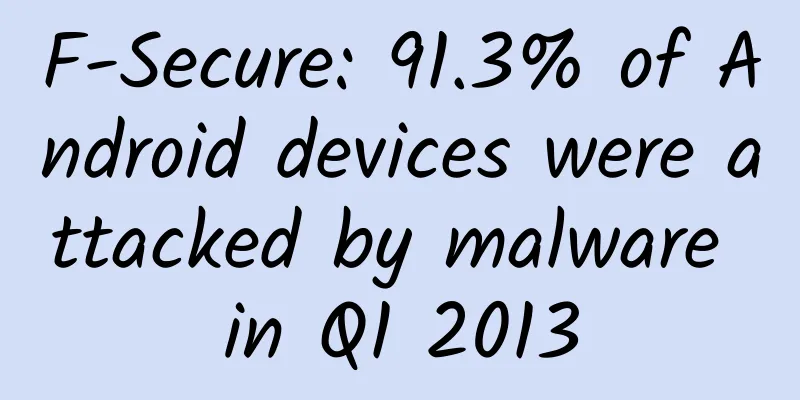F-Secure: 91.3% of Android devices were attacked by malware in Q1 2013

|
The variety and sophistication of malware targeting mobile devices is growing rapidly – but it’s not limited to the Android platform at the moment. Malware researchers from F-Secure Labs say that the number of active mobile malware families and variants began to surge in the fourth quarter of last year. Android "monopolizes" malware <br /> Malware researchers from F-Secure Labs said that during the fourth quarter of last year, the number of active mobile malware families and variants began to surge. Among them, Android rose from 49/74 to 96/100. F-Secure's latest report shows that Android was attacked by malware as high as 91.3% in the first quarter of this year. In addition to Android, the only other operating system that was found to be attacked was Symbian, while BlackBerry, Windows Phone and iOS were not found to have any malware attacks. Android malware attacks surpass XP popularity <br /> While researchers point to the increasing variety of malware, the most worrying thing now seems to be the "malware professional vendors" - they specialize in laying out "commoditized" malware services on the Android platform. Researchers say this phenomenon means that the Android malware ecosystem is showing signs of developing towards Windows. It is reported that many malware developers often use software updates to install malicious code in users' mobile systems - either running a series of paid calls after the user falls asleep or installing SMS spyware to specifically intercept users' bank account information. Such attacks generally do not occur on iOS because Apple strictly stipulates that third-party developers do not have the right to ask users for permission or install their own backdoors in the system to obtain users' SMS information. Android malware isn't limited to low-quality software <br /> Now, more and more malware developers are targeting users who use their Android devices as feature phones. It is reported that in order to improve the serious fragmentation of Android, Google has begun to stop counting users who do not install applications in the system installation data statistics. The fact is that most people are still using a very low version of the Android system. F-Secure security consultant Sean Sullivan wrote in a report, "Let's put it this way: I didn't need to worry about my mother's Android phone before, because she didn't install any software. Since the emergence of the Stels Trojan virus, I think I have reason to worry. Android malware began to spread through spam, and my mother happened to use her phone to check emails." The Stels Trojan virus attacks Android phones through a fake IRS-related email. While users on any mobile platform, including iOS, can be targeted by spam, Apple is vigilant and releases patches and iOS updates to prevent this from happening. Unfortunately, although Andorid can solve this problem by imitating methods similar to Apple, since most of its users rarely update the system, even if Google and its partners release patches and updates, most users will still not be able to enjoy them. |
<<: The development of social media in the United States
>>: Gartner: iPhone market share continues to decline, strategy must be adjusted to maintain growth
Recommend
7 types of women are prone to cervical cancer
Cervical cancer is one of the important cancers t...
Who is Xu Guanghan's ex-girlfriend? What is Xu Guanghan's ex-girlfriend Jian Jie's Instagram name?
Since Xu Guanghan became popular, some people hav...
Menstruation is not clean after caesarean section
Cesarean section is a very popular method of deli...
What is the cause of bleeding after endometrial polyp surgery?
Some patients with endometrial polyps have found ...
How many calories does chrysanthemum hawthorn tea have? Who is suitable to drink chrysanthemum hawthorn tea?
Drinking chrysanthemum tea and hawthorn tea on an...
The most searched topic! After having an erection, be sure to be alert to this disease
recently Various rumors circulating on the Intern...
The first Ningxia middle school student science fiction essay competition award-winning works display: delicious candied haws
Editor: Kang Yan Reviewer: Yang Pengbin (Ma Shixi...
Can I eat mooncakes when I am menstruating?
Of course, mooncakes are indispensable during the...
What are the reasons for severe hair loss in women?
It is often said that a woman's elegant aura ...
Causes of angina in women
In our daily life, we have all heard of the disea...
What should patients with liver disease pay attention to in their diet and lifestyle?
Liver disease is a group of clinical conditions t...
Can moxa fumigation cure gynecological diseases?
Moxibustion is actually a relatively good health ...
Nature: Which one makes you more likely to get cancer: eating meat or being a vegetarian?
A study published in Nature on December 22 analyz...
It hurts to the bone! You must know this information about influenza B
[Danger! #Woman's two lungs turned white afte...









